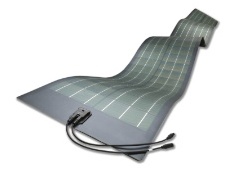Sep 3 2010
Global Solar Energy, Inc., a leading manufacturer of high-efficiency Copper Indium Gallium diSelenide (CIGS) solar material, today unveiled its flexible building integrated photovoltaic (BIPV) module: the PowerFLEX™ BIPV. Specially designed for commercial and industrial rooftops, PowerFLEX BIPV modules can deliver more power per rooftop than any other solar solution. With the PowerFLEX BIPV module, rooftops can quickly and cost effectively start generating clean energy.
Global Solar will showcase its PowerFLEX BIPV at the 25th European Photovoltaic Solar Energy Conference and Exhibition (25th EU PVSEC) / 5th World Conference on Photovoltaic Energy Conversion (WCPEC-5), September 6-9 in Valencia, Spain.
With 12.6 percent aperture efficiency, Global Solar PowerFLEX BIPV delivers the highest efficiency in the flexible module industry. The module has a large format (5.75m x 0.5m) and a high power density (300W) enabling it to outperform other flexible solar roofing solutions currently on the market, including 50 percent more energy and power than the current amorphous silicon standard.
 The PowerFLEX BIPV module
The PowerFLEX BIPV module
Global Solar’s PowerFLEX BIPV module directly addresses the biggest concerns posed by the roofing industry regarding solar integration. It is lightweight and can be applied directly to a roofing surface, requiring no mounting hardware, no roof penetrations, and creates no additional wind load. Designed especially for roofs, Global Solar’s PowerFLEX BIPV maintains the integrity and aesthetics of a building structure. Because of its large format and high power density, Global Solar’s PowerFLEX BIPV will also lower installation and balance of system (BOS) costs.
Although traditional glass solar modules are too heavy for many commercial applications, they have been one of the few options available to the building industry for solar energy generation. Unlike conventional glass modules, which are heavy, rigid and typically installed at an angle on racks, PowerFLEX BIPV modules are lightweight and flexible, and installed flat directly on the roofing surface. This allows the modules to cover a greater amount of rooftop space that, depending on the location of the building, can equate to 50-100 percent more power and energy per rooftop than a tilted solar array. This advantage is particularly acute at higher latitudes.
“At Global Solar, we recognized that the building industry has not been able to fully optimize the real estate on the rooftop with solar solutions currently available,” said Dr. Jeff Britt, CEO of Global Solar Energy. “We worked closely with roofing professionals when we designed the PowerFLEX BIPV, and their experience mattered to us. Leveraging their input, we now offer a high-powered module that will create the most powerful rooftops in the world.”
Industry research is showing that the BIPV market is heating up. Lux Research reported that by 2013 the BIPV market will reach $5.7 billion. Solutions that will succeed are ones that meet the power, design and cost requirements set by the building and roofing industries.